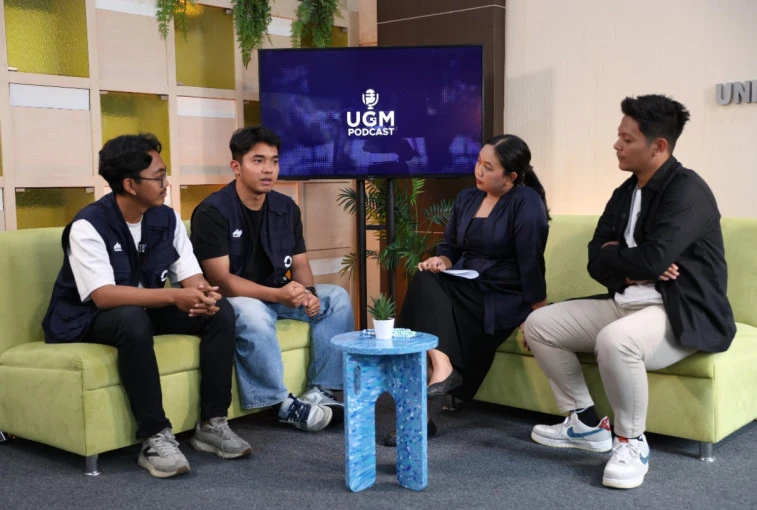Plastic pollution has long been one of the most pressing global environmental problems. Every year, millions of tons of plastic end up in landfills and oceans, harming ecosystems and contributing to climate change. In Indonesia, the problem is especially visible, as the country is one of the world’s largest contributors to marine plastic waste. Amid this crisis, young entrepreneurs and researchers are increasingly turning to innovation as a solution. One such effort comes from Renou, a student-led startup from Universitas Gadjah Mada (UGM), which has developed a business model focusing on plastic waste recycling into sustainable furniture.
The startup represents a growing movement in Southeast Asia, where sustainability and entrepreneurship meet to create solutions that not only protect the environment but also build economic value. Plastic waste recycling is more than a trend; it is becoming a critical part of how societies reimagine their relationship with consumption, production, and waste management.
Student Innovation and the Birth of Renou
Renou was established by UGM students who recognized the urgency of the plastic crisis in Indonesia. Rather than allowing plastic waste to accumulate and pollute the environment, they envisioned a circular economy solution by transforming discarded materials into functional, high-value products. Their primary focus has been on producing furniture made entirely from recycled plastics.
The innovation does not just reduce waste but also creates durable, aesthetically appealing items that can compete with traditional furniture in both quality and design. By using techniques that process and mold plastic waste into usable material, the team has been able to build chairs, tables, and other household products. This approach highlights how plastic waste recycling can become a profitable business model while promoting sustainability.
In an interview reported by Universitas Gadjah Mada, the founders emphasized that their mission goes beyond making products. They aim to build public awareness about the importance of responsible waste management and encourage communities to see waste not as trash but as a resource. Their perspective aligns with the global push toward sustainable design and innovation.
Why Plastic Waste Recycling Matters For Indonesia
Indonesia faces a critical plastic problem. According to a study published in Science Advances (2021), Indonesia ranks second in the world for mismanaged plastic waste entering the ocean. With a population of over 270 million and limited waste management infrastructure, the country struggles to cope with the vast amount of plastic consumed daily.
Plastic waste recycling startups like Renou provide a vital response. By integrating circular economy principles into their business models, they help reduce the pressure on landfills and oceans while also stimulating green jobs and innovation. The use of recycled plastic in furniture manufacturing also demonstrates the material’s potential beyond single-use products. Instead of being disposed of, plastic gains a second life as long-lasting, practical goods.
Moreover, initiatives like Renou have the potential to inspire collaboration between universities, businesses, and policymakers. They show how young innovators can take leadership roles in solving complex environmental issues and set an example for future entrepreneurs across the region.
The Market Opportunity For Sustainable Furniture
Globally, the demand for sustainable furniture is growing. Consumers are increasingly concerned about the environmental impact of their purchases, and recycled materials have become a major selling point in the design industry. A report by Allied Market Research estimates that the global sustainable furniture market will reach USD 59.8 billion by 2030, driven by rising environmental awareness and government regulations promoting eco-friendly products.
Indonesia is in a strong position to capture this momentum. The combination of a large domestic market, abundant supply of plastic waste, and a young entrepreneurial population makes the country a natural hub for innovation. Startups like Renou are at the forefront of this shift, not only creating value for customers but also reshaping how industries view materials and production processes.
Plastic waste recycling in the furniture industry can also support Indonesia’s broader sustainability goals. The government has committed to reducing marine plastic waste by 70% by 2025, and grassroots startups can play a significant role in reaching this target. By integrating entrepreneurship with environmental responsibility, these initiatives highlight a pathway toward both ecological preservation and economic growth.
Challenges and the Road Ahead
Despite its potential, plastic waste recycling startups still face challenges. Scaling production requires advanced technology, reliable supply chains of waste materials, and substantial investment. Many startups also need stronger government support in terms of regulation, subsidies, and incentives for green businesses.
Public perception remains another challenge. Although awareness of sustainability is rising, many consumers in Indonesia still prioritize price over environmental impact. To shift this mindset, startups must invest in education campaigns and highlight the durability and quality of recycled products compared to conventional alternatives.
Looking ahead, Renou and similar ventures will likely need partnerships with larger companies, investors, and government agencies to achieve long-term impact. Collaborations with municipalities for waste collection, with universities for research, and with corporations for market distribution could help amplify the scale of their work.
Conclusion: A Model for Circular Innovation
Plastic waste recycling represents more than a solution to pollution. It embodies a new way of thinking about resources, consumption, and sustainability. The story of Renou, the student-led startup from UGM, illustrates how young innovators can create both environmental and economic impact by transforming discarded materials into valuable products.
As Indonesia continues to confront its plastic waste crisis, initiatives like these offer a hopeful vision for the future. By combining innovation, entrepreneurship, and environmental stewardship, plastic waste recycling startups are redefining the role of business in society. If scaled effectively, they could serve as a model not just for Indonesia, but for other countries grappling with similar challenges.
Read More






 Saturday, 28-02-26
Saturday, 28-02-26







